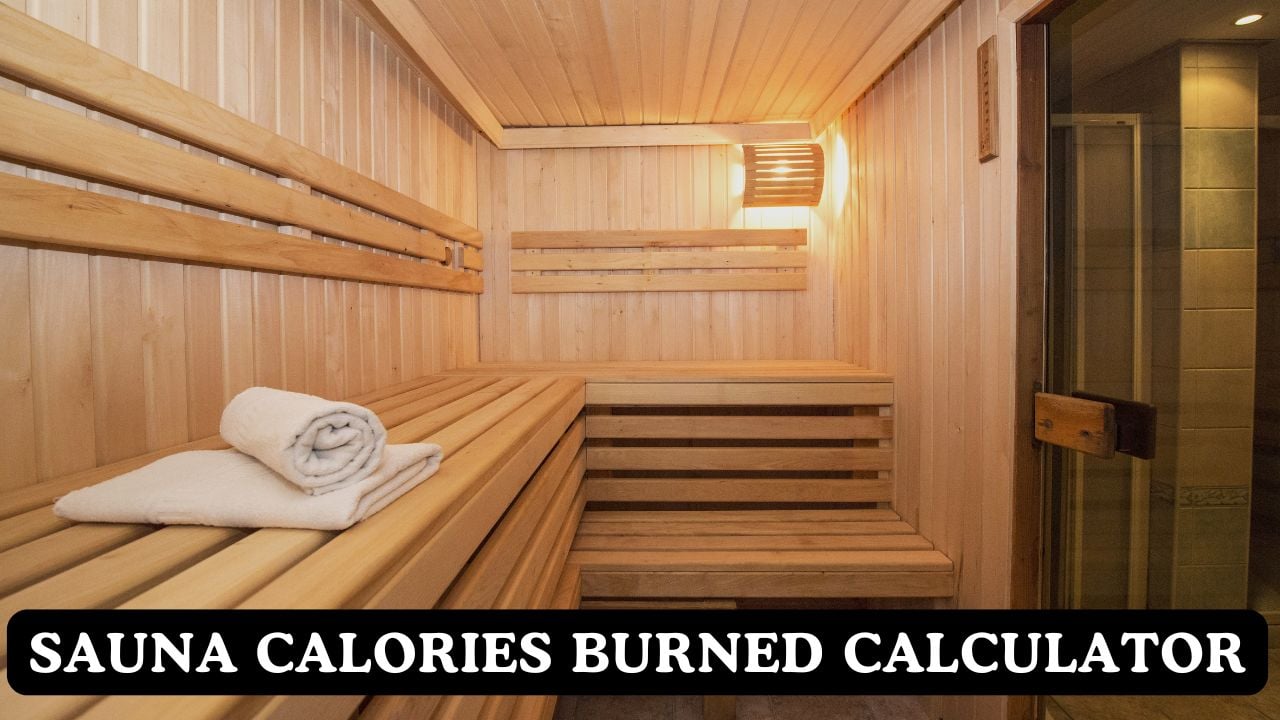Sauna Calories Burned Calculator
Calculate calories burned during sauna sessions using scientific research from Finnish studies and metabolic data

How Many Calories Does Sauna Burn?
Sauna sessions burn between 50-90 calories per hour depending on your body weight, sauna type, and temperature. According to research published in NCBI, sauna bathing typically ranges from 1.5-2.0 METs (Metabolic Equivalent of Task), making it comparable to light physical activity. For a 150-pound person, a 30-minute Finnish sauna session burns approximately 41-51 calories while providing significant cardiovascular and stress-reduction benefits through heat shock protein activation.
🌡️ Temperature Impact on Calorie Burn
Higher sauna temperatures significantly increase calorie expenditure through enhanced thermoregulation. Low-heat saunas (40-60°C) burn fewer calories but offer comfort for beginners, while high-heat saunas (80-100°C) can increase calorie burn by 20-33% due to increased heart rate and metabolic demands. Regular heat therapy also improves heat tolerance, allowing for longer sessions and greater calorie burn over time.
Sauna Types & Calorie Burn Comparison
| Sauna Type | Temperature Range | MET Value | Calories/Hour (150 lbs) | Best For |
|---|---|---|---|---|
| Finnish Sauna | 80-100°C (176-212°F) | 1.5-1.8 | 68-82 calories | Traditional heat therapy, cardiovascular benefits |
| Infrared Sauna | 45-60°C (113-140°F) | 1.5-1.7 | 68-77 calories | Deep tissue penetration, comfort |
| Steam Sauna | 40-50°C (104-122°F) | 1.8-2.0 | 82-91 calories | High humidity, intense sweating |
| Wood-Fired Sauna | 70-90°C (158-194°F) | 1.3-1.6 | 59-73 calories | Authentic experience, variable heat |
Scientific Research on Sauna Calorie Burn
📊 Finnish Population Studies
Landmark research from Finnish populations spanning over 20 years reveals that regular sauna use (4-7 times weekly) provides health benefits equivalent to moderate exercise. The studies show sauna bathing burns calories through increased heart rate (up to 120-150 BPM), enhanced circulation, and thermoregulatory responses. Participants who used saunas regularly showed 63% reduction in sudden cardiac death and 40% reduction in all-cause mortality, demonstrating that sauna’s benefits extend far beyond simple calorie burn.
🧬 Heat Shock Protein Activation
Research on heat shock proteins shows that sauna-induced hyperthermia activates protective cellular mechanisms that enhance metabolism, reduce inflammation, and promote longevity. These proteins require energy to produce, contributing to the calorie burn during and after sauna sessions. The metabolic boost can continue for hours post-sauna, similar to the afterburn effect seen in high-intensity exercise.
Calorie Burn by Body Weight & Duration
| Body Weight | 15 Minutes | 30 Minutes | 45 Minutes | 60 Minutes |
|---|---|---|---|---|
| 125 lbs (57 kg) | 17-21 calories | 34-42 calories | 51-63 calories | 68-84 calories |
| 150 lbs (68 kg) | 20-25 calories | 41-51 calories | 61-76 calories | 82-102 calories |
| 175 lbs (79 kg) | 24-29 calories | 47-59 calories | 71-88 calories | 95-118 calories |
| 200 lbs (91 kg) | 27-33 calories | 54-67 calories | 81-100 calories | 108-134 calories |
Note: Calorie ranges account for different sauna types, temperatures, and activity levels. Higher values represent steam saunas or active sessions, while lower values represent passive Finnish sauna sessions.
Health Benefits Beyond Calorie Burn
❤️ Cardiovascular Health
Regular sauna use provides cardiovascular benefits similar to moderate exercise. Clinical studies show that sauna bathing increases heart rate to 120-150 BPM, improves circulation, and enhances cardiac output. The heat stress mimics cardiovascular exercise, strengthening the heart muscle and improving overall cardiovascular fitness. This makes sauna an excellent complement to regular exercise routines for comprehensive heart health.
🧠 Mental Health & Stress Reduction
Sauna sessions significantly reduce stress hormones like cortisol while increasing endorphin production. Research shows that regular sauna use can reduce depression symptoms by up to 77% and may lower dementia risk by 66% in frequent users. The meditative environment promotes relaxation and mental clarity, making it an excellent addition to recovery protocols.
Maximizing Sauna Calorie Burn
🎯 Optimization Strategies
Temperature Progression: Start with moderate temperatures (60-70°C) and
gradually increase as heat tolerance improves.
Higher temperatures can increase calorie burn by 20-33% through enhanced
thermoregulation.
Active Sessions: Incorporate light stretching, breathing exercises, or gentle
yoga during sauna sessions.
This can increase calorie burn from 1.5 METs to 1.8-2.0 METs while maintaining safety.
Hydration Protocol: Proper hydration before, during, and after sauna sessions
optimizes metabolic function
and allows for longer, more effective sessions. Similar to intense workouts,
hydration is crucial for performance.
⏰ Timing & Frequency
Optimal Duration: Begin with 10-15 minute sessions and progress to 20-30
minutes as experience increases.
Longer sessions burn more calories but require careful monitoring of hydration and comfort
levels.
Weekly Frequency: Research suggests 4-7 sauna sessions per week provide optimal
health benefits and calorie burn.
This frequency allows for adaptation while preventing overexposure to heat stress.
Post-Workout Timing: Using sauna after strength training
can enhance recovery while adding additional calorie burn to your workout session.
Sauna vs Other Activities: Calorie Comparison
| Activity | MET Value | Calories/Hour (150 lbs) | Primary Benefits |
|---|---|---|---|
| Sauna Session | 1.5-2.0 | 68-114 calories | Cardiovascular health, stress reduction, recovery |
| Walking (2 mph) | 2.0 | 130 calories | Low-impact cardio, joint mobility |
| Yoga (gentle) | 2.5 | 163 calories | Flexibility, balance, mindfulness |
| Light Weight Training | 3.0 | 195 calories | Muscle building, bone density |
Key Insight: While sauna burns fewer calories than active exercise, it provides unique health benefits and can be used as a recovery tool to complement your training routine.
Safety Guidelines & Best Practices
🛡️ Essential Safety Tips
Hydration Protocol: Drink 16-20 oz of water before entering the sauna, sip
water during breaks,
and rehydrate thoroughly afterward. Dehydration reduces calorie burn and increases health
risks.
Temperature Progression: Start with lower temperatures and shorter durations,
gradually increasing
as your body adapts. This approach maximizes benefits while minimizing risks.
Listen to Your Body: Exit immediately if you feel dizzy, nauseous, or
uncomfortable.
Proper sauna use should feel challenging but never dangerous, similar to progressive exercise.
⚠️ Who Should Avoid Saunas
Medical Conditions: Individuals with uncontrolled high blood pressure, heart
conditions,
or pregnancy should consult healthcare providers before sauna use.
Medications: Some medications affect heat tolerance and sweating. Check with
your doctor
if you take blood pressure medications, diuretics, or other prescription drugs.
Alcohol & Substances: Never use saunas while under the influence of alcohol or
drugs,
as this significantly increases the risk of dehydration and heat-related illness.
Related Fitness Calculators & Tools
🔗 Complementary Calculators
Enhance your fitness journey with our comprehensive suite of calculators and tools:
• Body Composition: Track your progress with our body fat percentage charts
and understand how sauna use affects your overall health metrics.
• Exercise Planning: Combine sauna sessions with effective strength training routines
for optimal results and recovery.
• Recovery Optimization: Learn about recovery techniques
that complement sauna use for enhanced performance and reduced soreness.
⚕️ Medical Disclaimer
This sauna calorie calculator provides estimates based on scientific research and should not replace professional medical advice. Individual responses to heat therapy vary significantly due to genetics, health conditions, medications, and fitness levels. Sauna calorie burn estimates are based on population averages and may not accurately reflect individual metabolic responses. Always consult with healthcare professionals before beginning any new wellness routine, especially if you have pre-existing health conditions, take medications, or are pregnant. The information provided is for educational purposes only and should not be used as a substitute for professional medical guidance.

Manish is a NASM-certified fitness and nutrition coach with over 10 years of experience in weight lifting and fat loss fitness coaching. He specializes in gym-based training and has a lot of knowledge about exercise, lifting technique, biomechanics, and more.
Through “Fit Life Regime,” he generously shares the insights he’s gained over a decade in the field. His goal is to equip others with the knowledge to start their own fitness journey.
